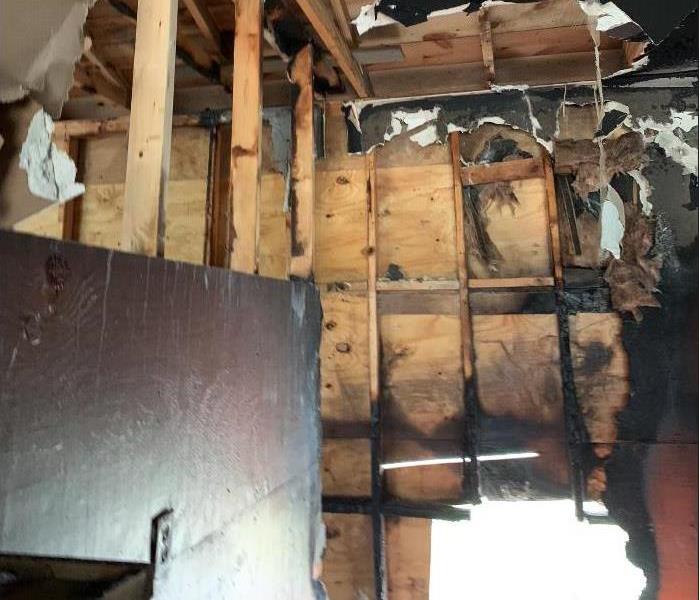Understanding Fire Safety Codes and Regulations
4/17/2024 (Permalink)
 In this blog, we will explore the importance of fire safety codes and regulations for residential and commercial buildings.
In this blog, we will explore the importance of fire safety codes and regulations for residential and commercial buildings.
Fire safety is a critical aspect of protecting both residential and commercial properties. Understanding and complying with fire safety codes and regulations is essential for safeguarding lives, minimizing property damage, and ensuring a secure environment. In this blog, we will explore the importance of fire safety codes and regulations for residential and commercial buildings, highlighting the key elements that property owners and managers need to consider to ensure compliance and minimize the risk of fire damage.
Residential Fire Safety Codes
Residential fire safety codes outline the requirements and guidelines necessary to enhance fire prevention and response in homes. These codes often cover aspects such as:
- Smoke alarms and detectors: The installation, location, and maintenance of smoke alarms are crucial for the early detection of fires. Codes specify the minimum number and placement of smoke alarms within residential properties.
- Fire extinguishers: Codes may mandate the presence of portable fire extinguishers to provide residents with the means to combat small fires before they escalate.
- Escape routes and egress: Fire safety codes commonly address the importance of clear and accessible escape routes, including properly sized and maintained windows and doors in bedrooms, satisfying egress requirements.
Compliance with residential fire safety codes is essential for ensuring the safety of occupants and minimizing the risk of fire damage.
Commercial Building Fire Safety Codes
Commercial building fire safety codes are more complex and comprehensive due to the larger scale, higher occupancy, and diverse uses of these premises. Some crucial elements addressed within these codes include:
- Fire suppression systems: Commercial buildings often require the installation and maintenance of fire suppression systems, such as sprinkler systems and fire suppression extinguishing systems, to control or extinguish fires quickly.
- Exit and emergency lighting: Adequate exit signage and emergency lighting are vital for directing occupants to safe exit routes during emergencies.
- Fire alarm systems: Commercial buildings typically require a comprehensive fire alarm system covering various areas, including manual pull stations, smoke detectors, heat detectors, and fire alarm control panels.
- Fire-rated construction: Codes may specify requirements for fire-rated walls, doors, and other building elements to limit the spread of fire and smoke within the building and provide safe evacuation paths.
Importance of Compliance
Complying with fire safety codes and regulations is not only a legal requirement but also a crucial part of responsible property ownership and management. Failure to adhere to these codes can lead to severe consequences, such as fines, penalties, liability issues, and increased risk of fire damage. Non-compliance may also result in difficulties with insurance coverage, as certain policies require adherence to fire safety codes.
Regular Inspections and Maintenance
To ensure ongoing compliance with fire safety codes, regular inspections and maintenance are essential. Property owners and managers should schedule inspections by qualified professionals to identify potential fire hazards, assess the condition of fire protection systems, and ensure compliance with relevant codes. Additionally, regular maintenance of fire safety equipment, including extinguishers, alarms, and sprinkler systems, is crucial to ensure optimal functionality.
Navigating Fire Damage Restoration
In the unfortunate event of a fire, prompt fire damage restoration is vital for minimizing further damage and restoring the property to its pre-fire condition. Working with professionals experienced in fire restoration is crucial to ensure comprehensive cleaning, deodorization, and restoration of the affected areas, complying with industry standards and regulations.
Understanding fire safety codes and regulations is crucial for protecting residential and commercial properties from fire hazards and minimizing the risk of fire damage. Compliance with these codes ensures the safety and well-being of occupants, provides peace of mind, and helps mitigate potential legal and financial repercussions. Regular inspections, maintenance, and prompt restoration by experienced professionals are instrumental in maintaining compliance and ensuring a safe environment. If your property has experienced fire damage, contact fire restoration specialists like SERVPRO® for professional fire restoration services that adhere to industry standards and fire safety regulations.



 24/7 Emergency Service
24/7 Emergency Service